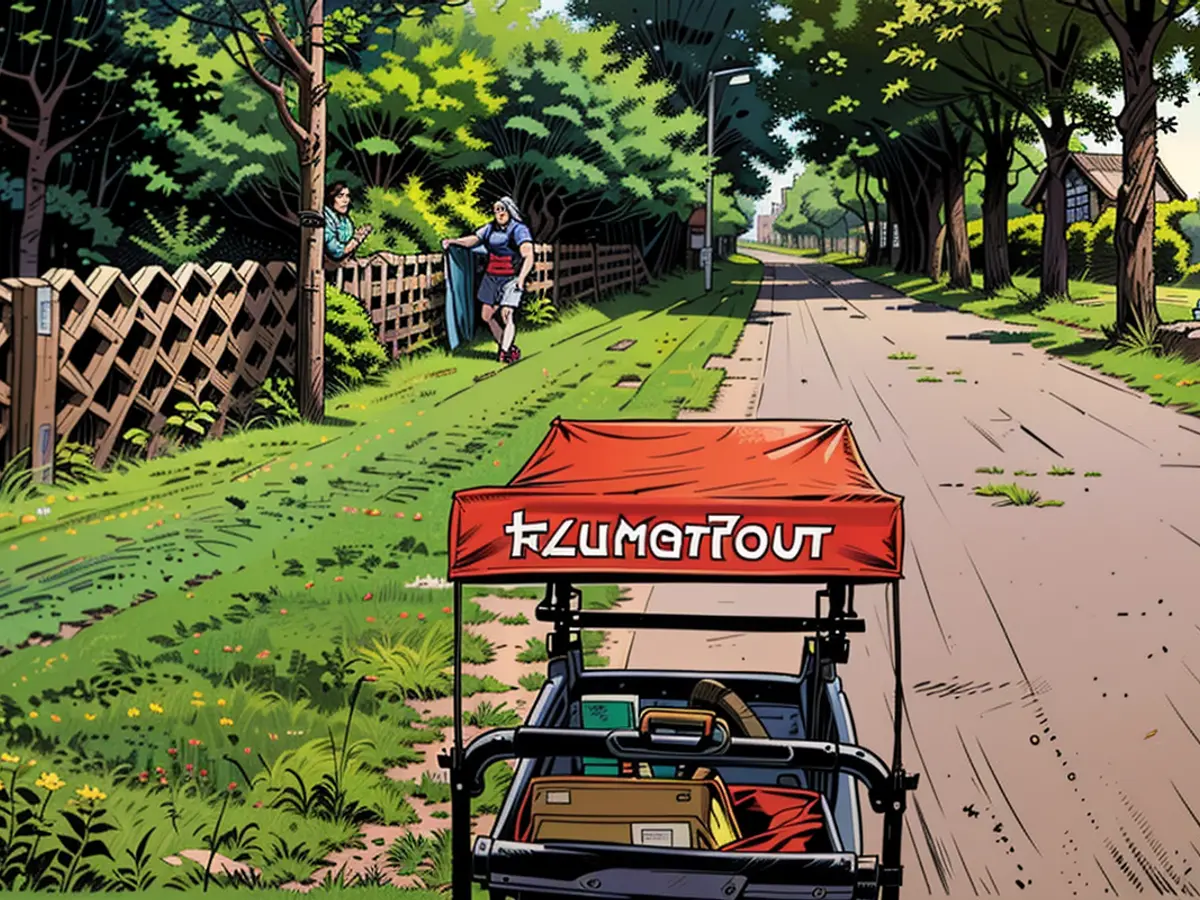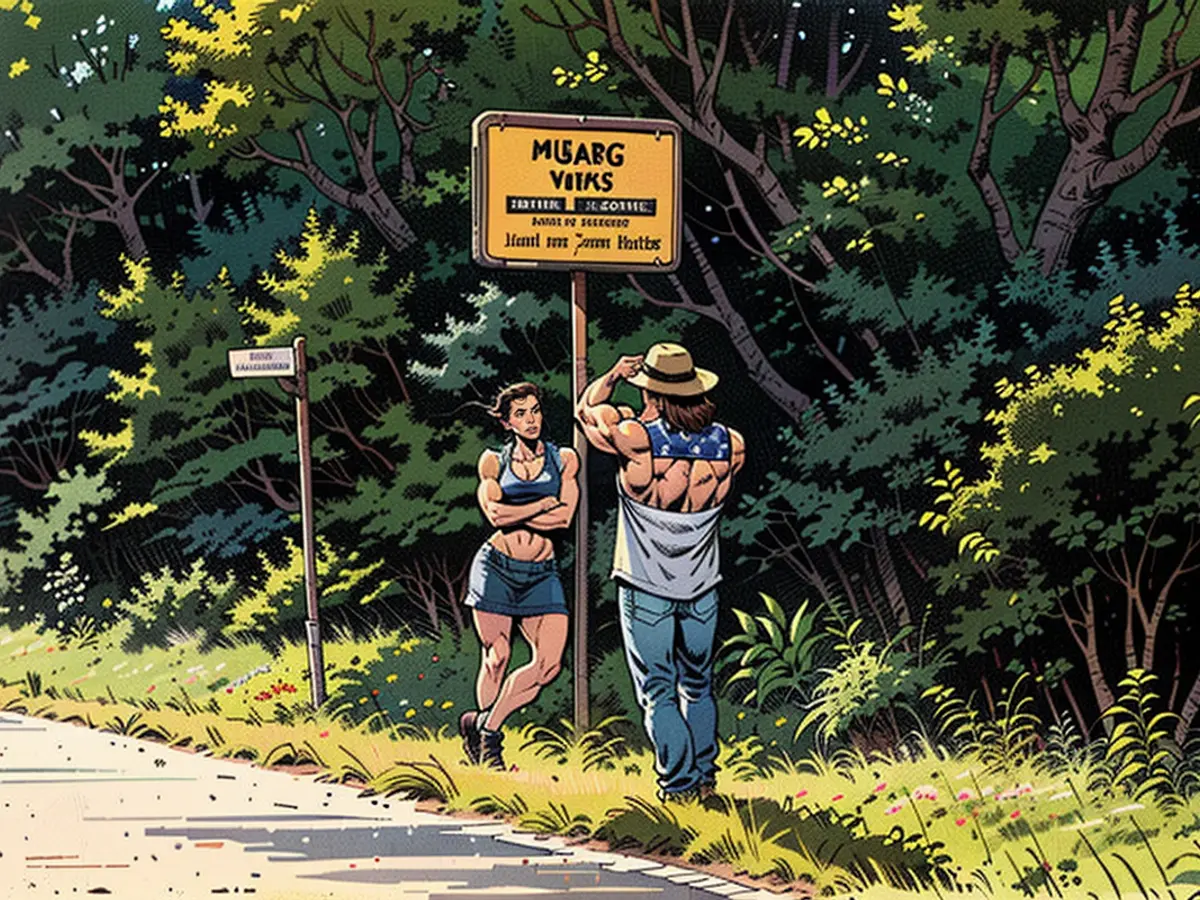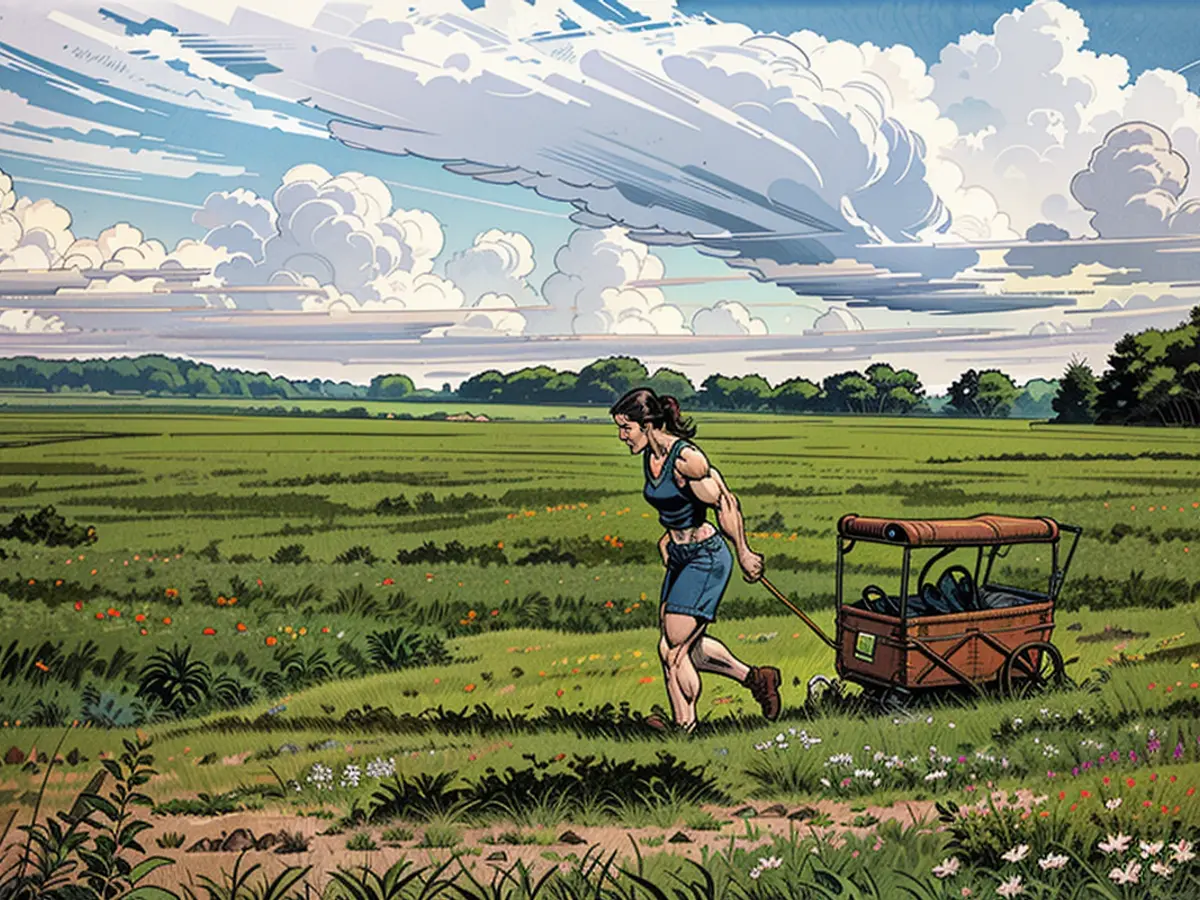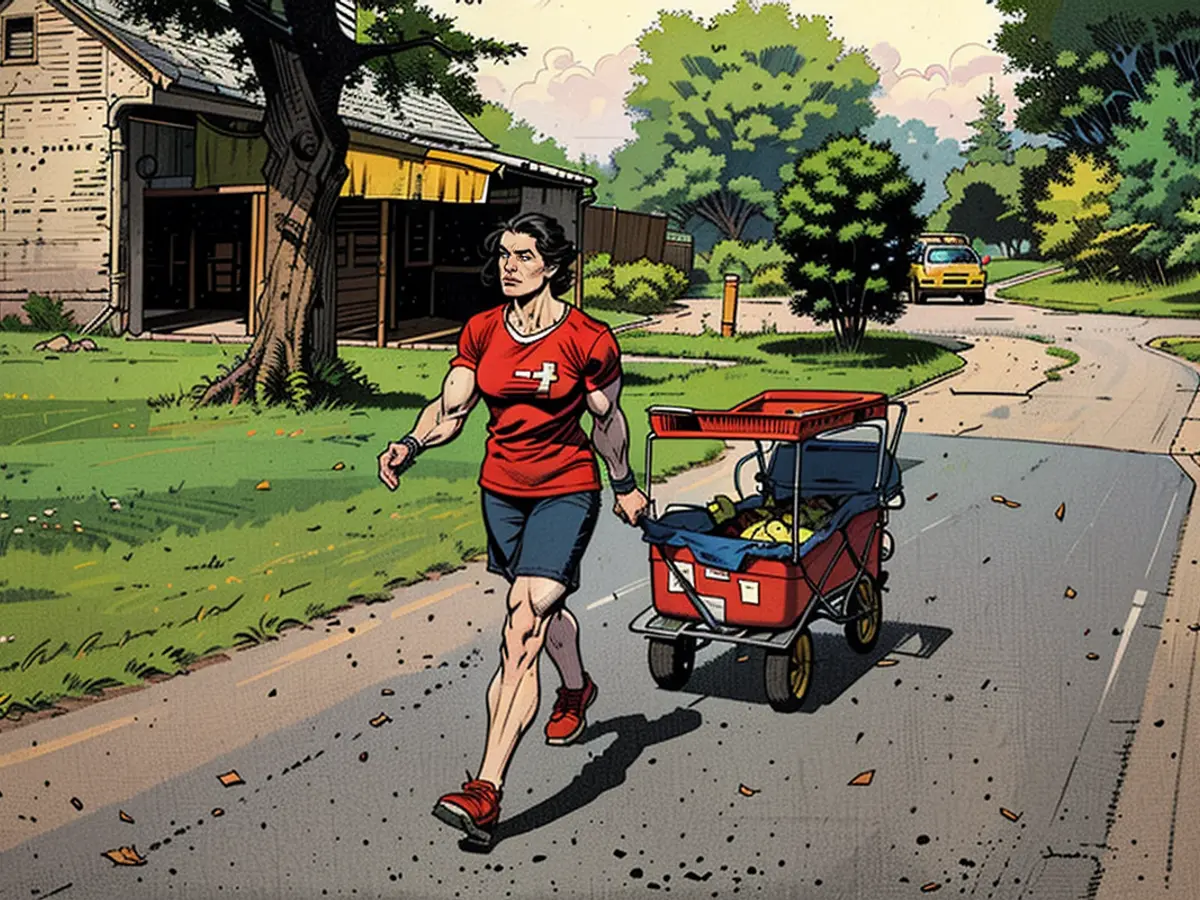Greetings, I serve as your representative in the Bundestag,...
Each year, SPD Bundestag representative Maja Wallstein traverses extensive distances throughout her Lausitz district constituency. This region is traditionally supportive of the AfD. She's joined by a companion who refuses to accept that people no longer communicate due to differing beliefs.
If one sits in front of their door long enough in Brandenburg Lausitz, they'll inevitably get a visit from Maja Wallstein - in sandals and pulling a cart. The SPD Bundestag member covers her Cottbus and adjacent Spree-Neiße area districts on foot, according to her, for several weeks each year, logging up to 600 kilometers. Regardless of whether an election is forthcoming or not, she strives to visit as many places as possible to combat the AfD rise and promote dialogue.
Maja Wallstein stresses, "I just can't accept that we can no longer speak to each other simply because we have differing beliefs." Witnessing this belief on an August Wednesday, when ntv.de tags along with her and her constituency employee Paul Weisflog, she retrieves Weisflog and the journalist from Cottbus Central Station. On the square outside the tall lamp posts, there's not a single one, but ten AfD advertisements – one for each pole.
Wallstein adopts caution in the AfD stronghold of Lausitz. She avoids displaying any obvious SPD symbols on her unassuming family automobile. Other MPs proudly display their names and faces on their cars. However, such behavior could be risky in a region where radical right-wing extremists have been active since the 1990s and early 2000s – and their influence has intensified since the AfD's rise. But that's a topic we'll delve into later.
"Hearing the word war makes me sick to my stomach"
Despite her fatigue, Wallstein insists on sticking to her plan. In the summer, while the Bundestag is on recess, she has to cover most of her tour, visit the numerous small towns, plus stock her handcart with flyers, information materials, and campaign gifts like pens and sweets. She also packs water, a nut mix, and dried figs. This sustenance is enough for her 17-kilometer journey through six villages with no convenience stores or snack bars.
Her initial stop is Trebendorf, also known as Trjebejce in sorbian: The bilingual welcome signs are a common sight in Lausitz, as are the visible smoke clouds from the Jaenschwalde power plant. Brown coal mining has nurtured the economically struggling region on the Poland border for many years. By 2038, coal mining will cease, and Lausitz will lead the transition towards renewable energy sources. Promised jobs and incentives for companies with cheaper electricity prices are to be the outcome, aiming to attract added businesses. Moreover, considerable investment has been made in the university city of Cottbus to secure the region's future.

As she enters Trebendorf, Maja Wallstein engages in an extended conversation with an elderly, fit pensioner who, after 29 years of operating cranes in the open-cast mine, claims, "We've never had it so well as now." Impressed, she does not need to persuade him. He's a lifelong SPD supporter, and the topic of arms deliveries to Ukraine bothers him. "Hearing the word war makes me sick to my stomach," he says, his voice trembling as he reflects on his own childhood memories of fleeing Poland. Wallstein connects this to her party's position on the matter. Before concluding the encounter, she gifts him a Polaroid with a joint selfie. He's thrilled.
An "Hello" with a Cliffhanger
Characteristically reserved, Brandenburg residents' behavior towards strangers endures despite the holiday break. On average, just the elderly populate their villages at this time, while most choose their workplaces, schools, doctors, and shops elsewhere, primarily by car. Farms dominate the many single-family houses, their well-maintained gardens clearly visible. Prosperity is a constant.
"Hello, I'm your Member of Parliament ... ", Wallstein initiates each encounter, introducing herself to those she sees on the street or near garden fences. In the 2021 federal elections, she won by a mere 2,352 votes over her AfD counterpart – the SPD experiencing popularity growth at the time. Many of those she approaches appear to be puzzled by the slender woman with the SPD-red wagon initially. Yet, once introduced, everyone responds appropriately, whether cheerfully, interested, hostile, or bordering on overwhelmed: Wallstein maintains her smile, unaware of the actual response in advance.
According to Wallstein, around 90% of encounters conclude amicably and peacefully. The plant is continually blooming. More frequently, she's being recognized once more, and more often, she engages in dialogue with individuals she met on previous strolls. The ones she doesn't come across, they receive a flyer in their mailbox. Wallstein and Weisflog also post their posters in the respective village centers.
"I don't want to mess things up"

Wallstein attempts to engage a woman with a skeptical expression at the garden fence in Gahry. The woman, however, can't pinpoint any specific concerns. Many folks from the east have distanced themselves from the political sphere in nearby Berlin. After all, they've been preoccupied with their own advancement in the years following the turnaround. This, Wallstein explains, is the reason for the public's detachment from politics. The hypothesis that many East Germans feel colonialized by the western influence put forth by Dirk Oschmann resonates with her. She consistently emphasizes the political stability of the majority of individuals in the east, pointing out that more than two-thirds of voters do not favor the AfD.
In Jethe, a woman tending to her garden acknowledges the lack of fiber optic connection as the sole issue in the vicinity. "I don't want to mess things up," Wallstein sympathizes. The feedback from constituents is mandatory for her to effectively represent them in Berlin. The woman then remembers her husband's concern about the eventual compatibility of their wood heating in the future. Wallstein distributes an informational sheet about the heating law and offers to provide personalized guidance in the constituency office.
Political parties and politicians encounter difficulty in discussing local concerns during the Eastern German state elections that took place over the summer. The war in Ukraine, aside from migration, is the most prevalent topic, with many individuals favoring a more passive stance towards Russia. The SPD's staunchly pro-West and NATO stance is not popular in Brandenburg. Seventy years of anti-American sentiments, unbroken since the Nazi era, are stronger than Russia's friendship endorsed during the DDR era.
Wallstein does not offer the simplistic solutions advocated by the AfD, which exploits people's prejudices and fears in their campaign by spreading Russian narratives. She promotes dialogue and sincerely explores different perspectives, even if they conflict with one another. She candidly shares her own fears about the war, expressing her doubts about the conflict's resolution based on reports from Chancellor Olaf Scholz. Despite her best efforts, Wallstein fails to leave an impact on the day.
Football serves as a unifying force
Wallstein admires the late East German Social Democrat, Regine Hildebrandt, who tirelessly advocated for women's and family issues. The similarities between the two are evident, with Wallstein labeled as "Krawallstein" by former SPD Minister President Mattias Platzeck due to her spirited nature. Although she speaks some Brandenburgisch, she cannot recreate Hildebrandt's renowned Berlin wit.

"If you want a better referee, you have to climb higher," Wallstein jokes with a firefighter and amateur footballer in Gahry. Wallstein offers to referee a match for the local club if she's rewarded with a beer afterwards. Regrettably, the firefighters failed to slip away unnoticed when they saw Wallstein approaching, leading to a casual conversation. Football serves as a medium for forming connections in places where they are scarce. Wallstein hopes these conversations could help "humanize" her.
Wallstein endures hate and abuse from the far-right, but she rarely discusses her personal safety concerns in public. Ever since the murder of Kassel's government president Walter Lübcke, even the most fearless individuals have to inquire about the potential consequences of scornful remarks and online threats. Is it still worth putting in the effort despite the mounting threats?
Why does Wallstein continue to persevere? She obtained a solid education and could switch to another endeavor. "I've never had a better job," she proclaims, deriving immense pleasure from the ability to bring about change and interact directly with people. Her enthusiasm remains unbent, even when she's required to pull a wagon through numerous kilometers of swampy terrain, where a path was expected.
Wallstein and Weisflog share amusing memories of past challenges, laughing off the pain in their throats and the fading of their voices. Despite her exhaustion, Wallstein refuses to stop talking. She runs as much as she can to maintain her stamina, preparing her for the numerous sprints she encounters as a referee. At least her energy levels would be sufficient for a career in federal politics, given that top politicians' famously low sleep requirements are well-known among the media.
However, Wallstein channels her power towards her domestic life and kin, not for a swift advance in her sphere. Yet, is this struggle worthwhile? She clocked in seven hours of foot travel that day. She possibly engaged in five genuine chats. She was belittled twice. On certain days, she encounters more individuals, shares Wallstein. She is an ardent advocate of face-to-face interactions: "At the core, we're all alike: We yearn for our dear ones to thrive," she muses during her commute back to Cottbus Central Station. No doubt, something valuable can emerge from this.
Despite the political tension in the region, Maja Wallstein continues her efforts to engage with her constituents, striving to combat the rise of the AfD and promote dialogue. During her visit to Trebendorf, she encounters an elderly pensioner who shares his concerns about the armed conflict in Ukraine. The man, a lifelong SPD supporter, expresses his discomfort with the word "war," referring to his own experiences of fleeing Poland as a child. Wallstein empathizes with his sentiment and connects it to her party's stance on the matter.









